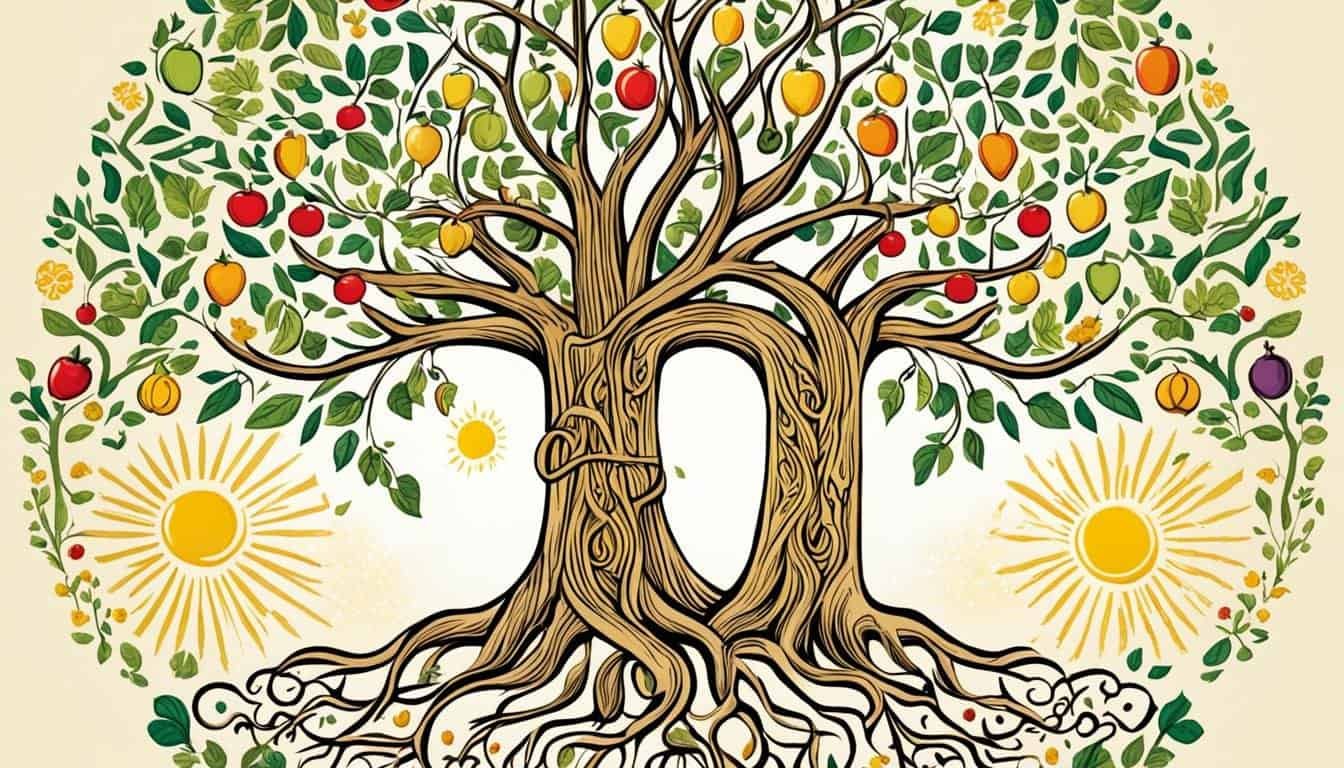Have you ever wondered if God is truly faithful to His promises? Is He steadfast in fulfilling the covenants He made with His people, even in the face of doubt and uncertainty? In the book of Romans, the apostle Paul reveals profound insights into the Abrahamic Covenant, highlighting God’s unwavering faithfulness and the implications it holds for believers.
Through this exploration of Romans, we will journey into the heart of the Abrahamic Covenant. We will see how God’s promises to Abraham extend far beyond a specific land or bloodline, embracing all who share Abraham’s faith. We will uncover the universal reach of the covenant and its implications for the present and the future.
So, does God truly remain faithful to His promises? Join us as we delve into the depths of Romans and discover the enduring faithfulness of our God, as revealed through the Abrahamic Covenant.
Bulletpoints:
- The book of Romans provides profound insights into the Abrahamic Covenant and God’s faithfulness to His promises.
- The covenant’s fulfillment extends beyond a specific land or bloodline, embracing all who share Abraham’s faith.
- God’s faithfulness to the Abrahamic Covenant has universal reach, impacting believers of all nations.
- Believers inherit the promises of the Abrahamic Covenant through faith, not by their own merits.
- The Abrahamic Covenant offers hope and assurance to believers in all circumstances.
Land and Legacy: A Promised Home for Generations (Romans 4:13)
In Romans 4:13, the apostle Paul delivers a powerful message about the enduring promise of a land for Abraham’s descendants. This promise extends beyond Abraham’s time and holds significance for believers, both past and present.
Paul highlights the idea of a promised home that spans generations, emphasizing God’s faithfulness to His covenant with Abraham. This covenant was not limited to a specific time or place but continues to impact believers today. It serves as a testament to God’s enduring commitment to His people and His desire for them to have a place to call their own.
“The promise to Abraham and his offspring that he would be heir of the world did not come through the law but through the righteousness of faith.” – Romans 4:13
In this passage, Paul reminds us that the fulfillment of the promise is not based on legalistic adherence but on faith. It is through faith that we, as Abraham’s spiritual descendants, become heirs of the promise, inheriting the blessings that were originally bestowed upon him.
The concept of a promised land and a legacy that stretches across generations holds great significance for believers today. It reminds us of God’s faithfulness, His provision, and His desire to establish a home for His people. Just as the Israelites looked forward to entering the physical land of Canaan, we, as believers, can look forward to the fulfillment of God’s promises in our own lives.
In Romans 4:13, Paul presents a powerful message of hope, assuring us that God’s promise of a land and legacy remains steadfast. This provides us with confidence and assurance as we navigate our own journeys of faith, knowing that we are part of a greater narrative that spans generations.
| Key Points: | Key Verses: |
|---|---|
| The promise of a land and legacy extends beyond Abraham’s time | Romans 4:13 |
| God’s covenant with Abraham impacts believers today | Romans 4:13 |
| God’s faithfulness to His promises provides hope and assurance | Romans 4:13 |
From One Man to Many: A Nation Built on Faith (Romans 4:16-17)
In our exploration of the Abrahamic Covenant, we discover that its scope extends far beyond a single bloodline. Instead, it encompasses all who share Abraham’s faith, birthing a nation built on faith. Romans 4:16-17 beautifully encapsulates this expansive promise of God.
“Therefore, the promise comes by faith, so that it may be by grace and may be guaranteed to all Abraham’s offspring—not only to those who are of the law but also to those who have the faith of Abraham. He is the father of us all. As it is written: ‘I have made you a father of many nations.’ He is our father in the sight of God, in whom he believed—the God who gives life to the dead and calls into being things that were not.”
These verses highlight the inclusivity of the Abrahamic Covenant, revealing God’s intention to create a diverse community of believers united by faith. This profound truth brings comfort and assurance to all who trust in God’s promises.
- First, we see that the promise is received through faith and not by works, emphasizing God’s grace as the foundation of our relationship with Him.
- Second, the promise is guaranteed not only to those who observe the law but to all who possess the faith of Abraham, further emphasizing the universality of the covenant.
- Lastly, we are reminded of the incredible power of the God we serve—the God who gives life to the dead and brings existence to things that did not previously exist. This promises hope and new beginnings for all who trust in Him.
Through this passage, we are reminded that we are part of a grand narrative—a spiritual lineage that traces back to Abraham’s unwavering faith. We are united as a diverse, yet united, nation built on the foundation of faith in God’s promises.
The Inclusive Love of God
In Romans 4:16-17, the apostle Paul highlights the inclusive love of God. He reveals that the Abrahamic Covenant is not limited to a specific bloodline but encompasses believers from all nations, generations, and walks of life. This radical inclusivity demonstrates God’s desire for a diverse and united family, bound together by their faith in Him.

| Key Points | Implications |
|---|---|
| The promise comes by faith and is guaranteed to all Abraham’s offspring, irrespective of the law. | Every believer, regardless of their background or heritage, has a part in the Abrahamic Covenant. |
| Abraham is considered the father of many nations, symbolizing the diverse community of believers. | God’s love and promises transcend cultural and ethnic boundaries, fostering unity among believers. |
| God gives life to the dead and calls into being things that were not. | Believers find hope and assurance that God can transform and bring forth new life and possibilities. |
Blessing All Nations: A Universal Reach (Romans 4:11-12)
In Romans 4:11-12, we discover the vast scope of the Abrahamic Covenant. It extends far beyond a specific land, encompassing a universal reach that transcends borders and cultures. These verses hint at the extraordinary plan of God to bless all nations through the covenant.
As we delve into the significance of Romans 4:11-12, we come to understand that the covenant’s purpose goes beyond the physical blessings bestowed upon Abraham’s descendants. It reveals God’s heart for all people, opening the door to salvation and redemption for every nation.
“And he received the sign of circumcision, a seal of the righteousness that he had by faith while he was still uncircumcised. So then, he is the father of all who believe but have not been circumcised, in order that righteousness might be credited to them. And he is then also the father of the circumcised who not only are circumcised but who also follow in the footsteps of the faith that our father Abraham had before he was circumcised.” (Romans 4:11-12, NIV)
These verses affirm that Abraham is not only the spiritual father of those who share his faith but also of those who believe in God’s covenant despite not being physically part of Abraham’s bloodline. It emphasizes the inclusive nature of the Abrahamic Covenant, offering hope and salvation to people from all nations.
The universal reach of the covenant holds great significance for believers today. It is a reminder that God’s plan for humanity extends far beyond our individual circumstances or cultural boundaries. Through the work of Christ, the blessings promised to Abraham are made available to all who put their faith in Him.
Heirs through Promise, Not Works (Romans 4:14)
When it comes to the Abrahamic Covenant, the apostle Paul, in Romans 4:14, emphasizes that our inheritance as heirs is not based on our works, but rather on the promise made by God. This distinction is crucial, as it highlights the role of faith and God’s grace in receiving the promises.
Through the Abrahamic Covenant, God made a pledge to Abraham and his descendants to bless them and give them a special land. However, Paul clarifies that this inheritance is not earned through our own efforts or good deeds but is bestowed upon us through faith.
By highlighting this truth, Paul reminds us that we are not justified or worthy of God’s promises based on our own merit. Instead, our status as heirs is solely a result of God’s grace and faithfulness to His covenant.
Paul’s words serve as a profound reminder that our salvation and the blessings of God are not dependent on our performance but on His unwavering faithfulness. It is through our faith in Jesus Christ and our trust in God’s promises that we become heirs of the Abrahamic Covenant.
The Impact on Believers
This understanding has significant implications for believers today. Knowing that we inherit God’s promises through faith rather than works frees us from the burden of trying to earn our salvation or blessings. We can rest in the assurance that God’s faithfulness remains steadfast, regardless of our shortcomings or failures.
Furthermore, this truth invites us to approach our relationship with God with humility and gratitude. It reminds us that our standing as heirs is not a result of our own achievements, but a result of God’s grace and love for us. This knowledge should lead us to a place of worship and thanksgiving, acknowledging God’s sovereignty and goodness in fulfilling His promises.
“For if those who depend on the law are heirs, faith means nothing and the promise is worthless, because the law brings wrath. And where there is no law there is no transgression.”
Paul’s words in Romans 4:14 echo the truth that our status as heirs is not contingent on our adherence to the law but on our faith in God’s promise. The law, with its requirements and regulations, cannot save us or make us heirs. It is only through faith, trusting in God’s faithfulness, that we receive the inheritance promised to Abraham.
As we live out our faith, we can find comfort and encouragement in the knowledge that our position as heirs is secure, not because of our own efforts, but because of God’s unchanging promise. This understanding enables us to walk confidently and joyfully in the freedom and grace that comes from being heirs through promise, not works.

The God Who Makes the Dead Live (Romans 4:17)
One of the most profound verses in the book of Romans is Romans 4:17. This verse reveals the incredible power and faithfulness of God in fulfilling His promises. In this passage, we see the connection between God’s ability to bring life to the dead and His commitment to fulfilling the covenant He made with Abraham.
As believers, we can find hope for the future in the truth that the same God who created life out of nothing is the God who remains faithful to His promises. Just as He called forth life from the darkness, He will bring to fruition the promises He has made to us.
Through the Abrahamic Covenant, God pledged blessings and an inheritance not only to Abraham but to all who believe in Him. This includes us – the future generations of believers. The hope we have for the future rests in the trustworthiness of God’s character and His ability to bring about what He has promised.
Just as God’s power breathed life into the dead, His promises have the power to revive our spirits and give us hope. In moments of doubt or uncertainty, we can hold onto the assurance that God is faithful, and He will fulfill the promises He has made to us.
The Promise of Life
When we consider the significance of Romans 4:17, we are reminded of the transformative power of God’s promises. Just as He brought life to the dead, He can bring life and hope into every area of our lives. Whether we are facing relational challenges, health issues, or personal struggles, we can trust that the God who breathes life into the dead can breathe new life into our circumstances.
A Call to Embrace Hope
As believers, we are called to embrace hope, even in the face of adversity or uncertainty. The promise of a future filled with God’s blessings and inheritance gives us the strength to persevere and overcome challenges. It reminds us that our hope is not rooted in our own abilities or circumstances but in the unwavering faithfulness of God.
| Promises of God | Hope for the Future |
|---|---|
| Abundant life (John 10:10) | A future filled with purpose and joy |
| Healing and restoration (Jeremiah 30:17) | Hope for physical and emotional wholeness |
| Peace that surpasses all understanding (Philippians 4:7) | Assurance of inner peace and tranquility |
As we reflect on Romans 4:17, let us anchor our hope in the God who makes the dead live. Let us trust in His faithfulness to fulfill His promises and find comfort in the hope He offers for our future. No matter what we may face, we can find confidence in knowing that God is always at work, bringing life, hope, and fulfilling His covenant with us.
Faithful Even When We Doubt (Romans 4:19-21)
In Romans 4:19-21, the apostle Paul presents us with a powerful illustration of how Abraham demonstrated unwavering faith in God’s promise, even in the face of doubt. This passage serves as a testament to God’s relentless faithfulness, assuring us that He remains steadfast even when our own faith wavers.
“Without weakening in his faith, he faced the fact that his body was as good as dead—since he was about a hundred years old—and that Sarah’s womb was also dead. Yet he did not waver through unbelief regarding the promise of God, but was strengthened in his faith and gave glory to God, being fully persuaded that God had power to do what he had promised.” (Romans 4:19-21 NIV)
This passage depicts Abraham’s acknowledgement of his physical limitations as he and Sarah were well beyond childbearing years. Despite the circumstances, Abraham’s faith in God’s promise remained steadfast. He accepted the reality of his situation without allowing it to diminish his conviction in God’s faithfulness.
Abraham’s faith serves as an encouraging example for believers today. It reminds us that doubts and uncertainties can coexist alongside deep-seated trust in God. Even when we question, it is essential to recognize that God’s character does not change. His faithfulness endures, regardless of our emotional or intellectual struggles.
When our faith falters, we can find solace in Abraham’s unwavering trust. Just as God proved faithful to Abraham, He will also remain faithful to us. We can take comfort in the fact that our doubts do not negate God’s promises but rather create opportunities for Him to strengthen our faith and demonstrate His unwavering love and commitment to us.
Let us draw inspiration from Abraham’s example and continue to place our trust in the God who is faithful, even when we doubt.
Key Takeaways
- Abraham’s unwavering faith in God’s promise, despite his doubts, showcases God’s unchanging faithfulness.
- Our doubts do not diminish God’s promises or His commitment to us.
- God can use our doubts to strengthen our faith and deepen our understanding of His unwavering love.
What is the significance of the Abrahamic Covenant in understanding Israel’s role in God’s redemptive story, as discussed in Romans?
The Abrahamic Covenant plays a crucial role in Israel’s place in God’s redemptive plan, as discussed in Romans. It establishes Israel as God’s chosen people, with a special role in bringing salvation to the world. Understanding the role of Israel in God’s redemptive story is key to grasping the overarching narrative of Romans.
A Foundation for Hope in All Circumstances (Romans 4:20-21)
When faced with challenging circumstances, it’s easy to lose hope and succumb to despair. However, as believers, we have a firm foundation for hope that transcends all circumstances. In Romans 4:20-21, we are reminded of God’s unwavering faithfulness to the Abrahamic Covenant, which serves as a powerful testament to His commitment to His promises.
God’s faithfulness is not dependent on our circumstances or the strength of our faith. Instead, it is rooted in His unchanging character and boundless love for His people. Just as He fulfilled His promises to Abraham despite the seemingly impossible circumstances, He continues to uphold His promises to us today.
When we feel overwhelmed by the challenges of life, we can take comfort in knowing that God remains steadfast. His faithfulness provides us with a rock-solid foundation for hope, enabling us to trust in His plans and purposes, even when everything around us seems uncertain. No matter what we face, we can cling to the assurance that God is working behind the scenes, orchestrating everything for our ultimate good.
So, let us hold fast to the truth of Romans 4:20-21 and allow it to strengthen our faith and ignite hope within us. In the face of adversity, let us remember that our hope is not based on fleeting circumstances but on the unchanging nature of our faithful God. As we navigate all circumstances, big or small, may we find solace in the foundation of hope that rests in God’s steadfast love and His unwavering commitment to His promises.
Affiliate Disclosure: "As an Amazon Associate I earn from qualifying purchases made from links in this post. We are a participant in the Amazon Services LLC Associates Program, an affiliate advertising program designed to provide a means for us to earn fees by linking to Amazon.com."

